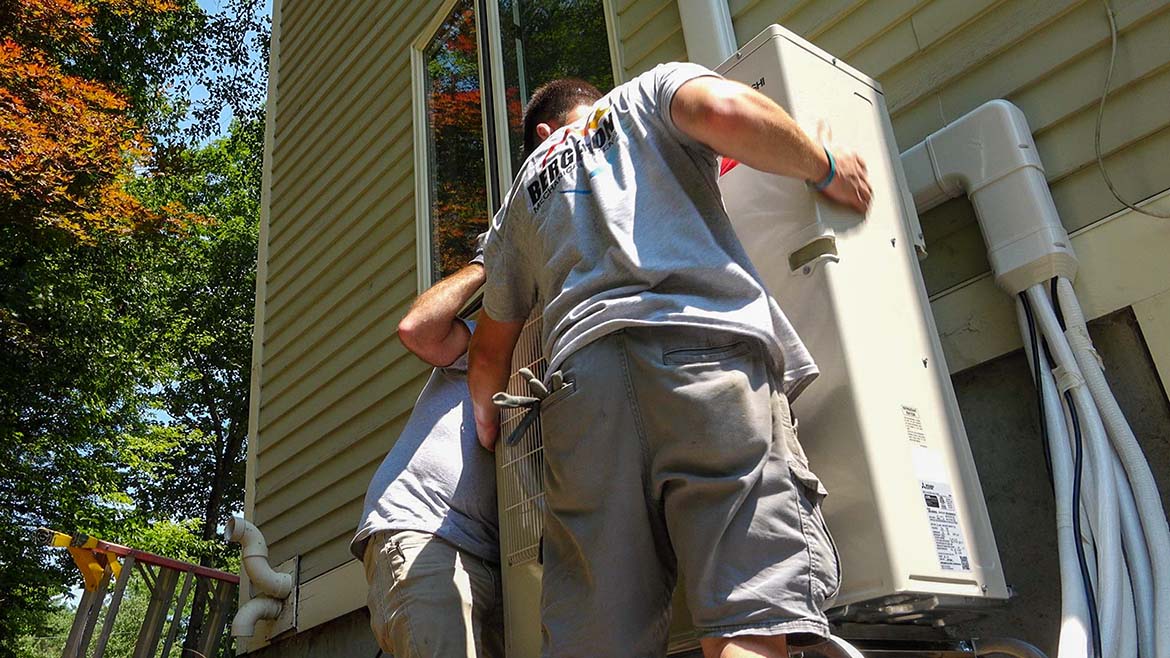The HVAC residential electrification trend conversation can sometimes be held in the abstract. Money coming from the government to incentivize homeowners to purchase a more energy-efficient product.
It is easy to forget that there have been contracting companies that have been very successful with heat pumps long before the Inflation Reduction Act (IRA). Kim Bergeron, master service technician and COO of K.E. Bergeron Mechanical Systems, is one such example. The COO is a second-generation owner and an Elite Diamond Contractor, which is a Mitsubishi Electric Trane HVAC U.S. contractor program.
Bergeron took over the business 22 years ago when there were only four employees. Today they are 20 strong and have grown thanks in large part to heat pumps.
“I have a lot to learn about managing people and I am learning every day,” Bergeron said. “But the one thing I am darn good at is designing and installing heat pumps.”
The company put in its first heat pump in 1989. Today, 70% of their business is heat pumps while the remaining 30% is still fossil fuel-based. “But we switch them over when we can,” Bergeron said.
How do they sell that many heat pumps? Bergeron shares that in the summer season, the technology tends to be an easy sell in their area of New Hampshire. They have a lot of older homes in the area that do not have central air. Bergeron explains to the customers what the technology is and what it can do. Then the conversation turns to the winter months.
“I let them know if they decide to use this in the winter months, this is the amount of energy that they will be using,” Bergeron said. “And depending on what rate they have, we can explain how much money they can save by running it on the heating side.”
The company came up with proprietary software that allows them to have closing success. They involve the homeowner when they go through the house to identify heat loss.
“It is an educational process and we will typically spend two hours in the home. But when we leave they have a proposal in hand and a good measure of confidence that a heat pump is the answer,” Bergeron said.
Most of their advertising has been focused on mini splits or heat pumps so that translates to 90% of their lead generation being heat pump-based. The marketing has paid off because despite charging the most for their services, the company has seen great growth. In 2022, they installed 178 outdoor heat pumps. That jumped to 300 in 2023 and they are on pace for 400 this year.

Bergeron Mechanical is on pace to install 400 heat pumps this year. (Courtesy of K.E. Bergeron Mechanical Systems)
“There are 120,000 homes in our zip codes. About 15,000 of them have heat pumps so we have a long way to go. It is about constant education,” Bergeron said.
This is not to say there are not some headwinds while they are trying to sell heat pumps in New Hampshire. One is trying to fight the stigma that these products do not work in cold climates. While that once was true, technology has advanced in the last few years.
Bergeron addresses this directly with his customers. He provides data that shows what the heat pump can do at an array of temperatures. He provides technical documents to ease the fears of the homeowner.
He also is fighting the perception that the products sometimes will not work effectively. Bergeron points to a North Carolina study from a few years back that said 9 out of 10 heat pumps were installed incorrectly. He explains to his customers what his company does that perhaps those other nine do not. He also explains that a lot of products work, but it is up to the contractor to install them properly.
And, keep in mind, the company is doing this without the IRA tax incentives. New Hampshire is currently not one of the states that are up and running with the program, although their application has been approved by the Department of Energy so it should be sooner rather than later.
“It’s going to be huge. Industry-wide prices are going up a bit. As we see the pricing go up, to have access to that type of funding will be great for sales. It is not a tax credit – it is cash money. That is impactful,” Bergeron said. “It’s going to be a game changer.”
With a higher installation ticket price, the tax incentives and rebates should help Bergeron see even more growth. But talking with the contractor over Zoom, his enthusiasm for the technology just leapt through the screen.
For me, this might be the biggest proof I see that this electrification trend is here to stay.


